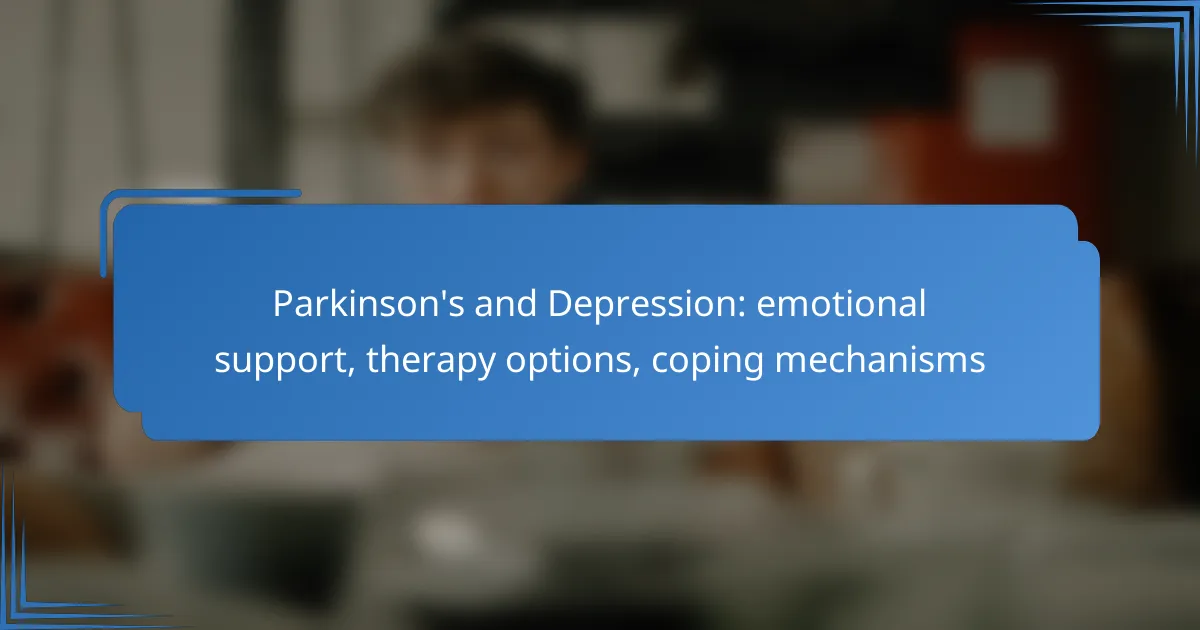Parkinson’s disease often coexists with depression, creating significant emotional challenges for those affected. Effective therapies, such as cognitive behavioral therapy and mindfulness-based approaches, alongside strong emotional support from family, friends, and community resources, can greatly enhance quality of life. Additionally, incorporating coping mechanisms like physical activity and creative expression can help individuals manage their emotional well-being more effectively.
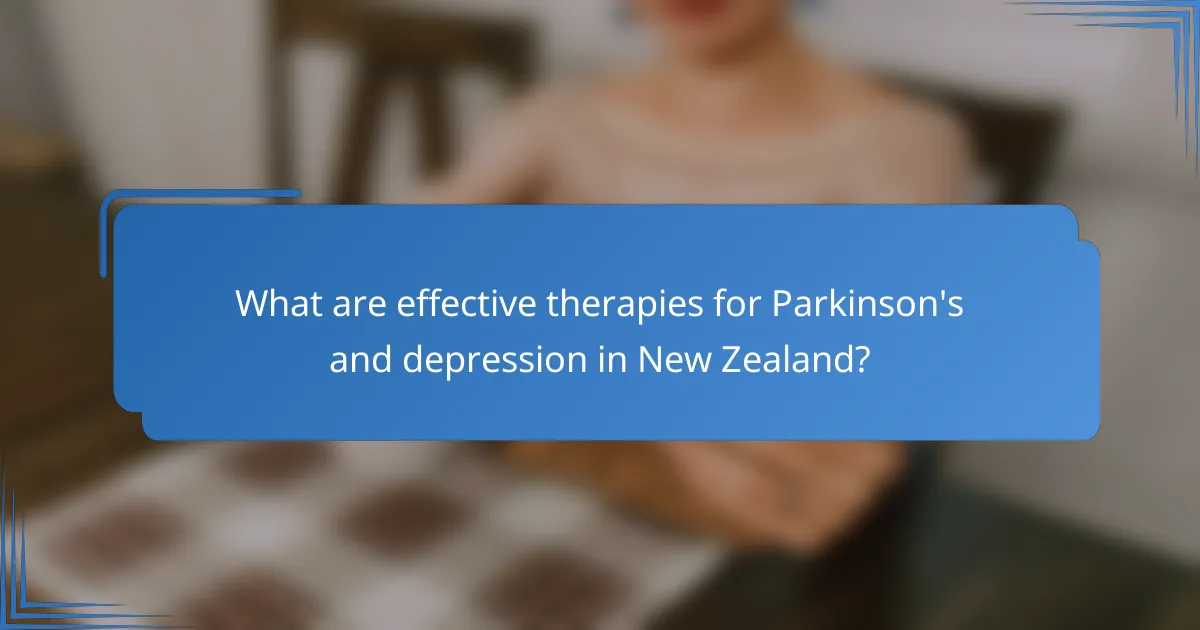
What are effective therapies for Parkinson’s and depression in New Zealand?
Effective therapies for managing Parkinson’s and depression in New Zealand include a combination of cognitive behavioral therapy, medication management, mindfulness-based therapy, and support groups. These approaches can help individuals cope with emotional challenges and improve their overall quality of life.
Cognitive Behavioral Therapy
Cognitive Behavioral Therapy (CBT) is a structured, goal-oriented approach that helps individuals identify and change negative thought patterns associated with depression and Parkinson’s. By working with a trained therapist, patients can learn coping strategies to manage their symptoms more effectively.
In New Zealand, CBT is often delivered in individual or group settings, and sessions typically last around 50 minutes. Patients may find it beneficial to attend weekly sessions for several months to see significant improvements.
Medication management
Medication management involves the careful prescription and monitoring of antidepressants or other medications that can alleviate symptoms of depression in Parkinson’s patients. Common medications include selective serotonin reuptake inhibitors (SSRIs) and other antidepressants, which can help balance mood and improve emotional well-being.
It’s essential for patients to work closely with their healthcare providers to find the right medication and dosage, as individual responses can vary widely. Regular follow-ups are crucial to assess effectiveness and adjust treatment as needed.
Mindfulness-based therapy
Mindfulness-based therapy focuses on cultivating awareness and acceptance of the present moment, which can reduce stress and anxiety associated with Parkinson’s and depression. Techniques such as meditation, breathing exercises, and yoga are often incorporated into these therapies.
In New Zealand, mindfulness programs may be available through community health centers or private practitioners. Engaging in mindfulness practices for just a few minutes daily can lead to noticeable improvements in emotional resilience over time.
Support groups
Support groups provide a platform for individuals with Parkinson’s and depression to share experiences, challenges, and coping strategies in a supportive environment. These groups can foster a sense of community and reduce feelings of isolation.
In New Zealand, many organizations offer support groups, both in-person and online. Participating in these groups can be a valuable resource for emotional support and practical advice, helping individuals feel less alone in their journey.
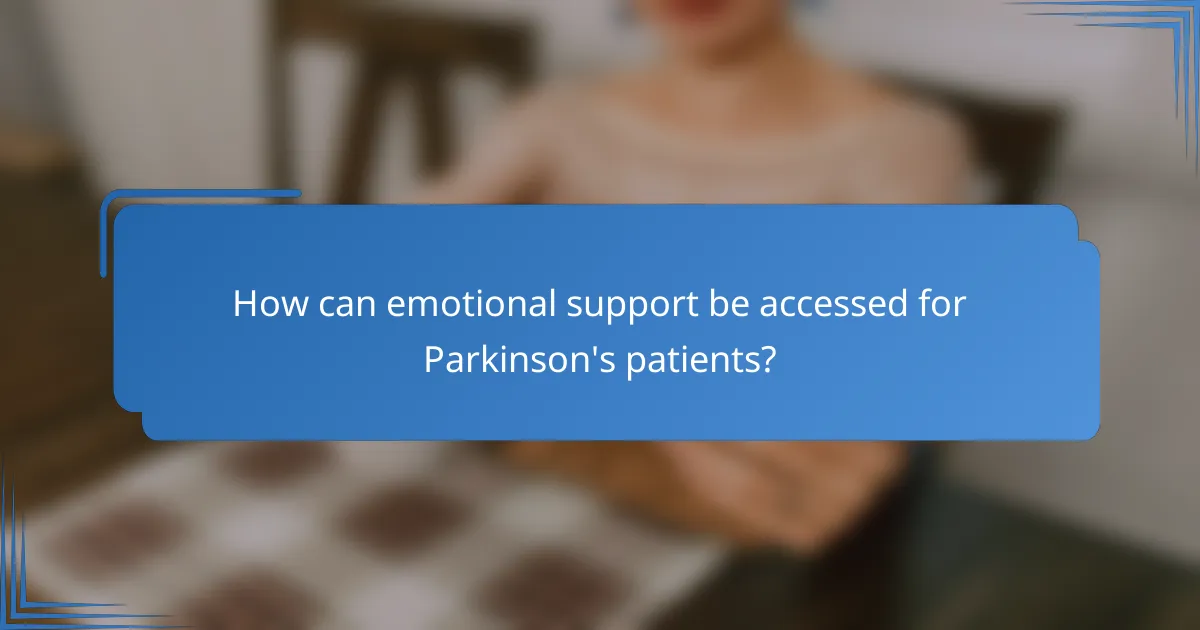
How can emotional support be accessed for Parkinson’s patients?
Emotional support for Parkinson’s patients can be accessed through various channels, including family and friends, professional counseling, and community resources. Each of these avenues offers unique benefits that can help individuals cope with the emotional challenges associated with the disease.
Family and friend support
Family and friends play a crucial role in providing emotional support to Parkinson’s patients. Their understanding and companionship can help alleviate feelings of isolation and anxiety. Regular communication, shared activities, and simply being present can significantly enhance a patient’s emotional well-being.
Encourage loved ones to learn about Parkinson’s disease to better understand the challenges faced. This knowledge can foster empathy and improve interactions. Simple gestures, like accompanying the patient to appointments or engaging in hobbies together, can strengthen these bonds.
Professional counseling services
Professional counseling services offer specialized support for Parkinson’s patients dealing with depression and anxiety. Therapists trained in chronic illness can provide coping strategies tailored to the unique emotional landscape of living with Parkinson’s. Cognitive-behavioral therapy (CBT) is often effective in addressing negative thought patterns.
Patients should consider seeking a licensed mental health professional who has experience with chronic illnesses. Many insurance plans cover therapy sessions, making it a viable option for those seeking help. Online therapy platforms can also provide convenient access to counseling from home.
Community resources
Community resources, such as support groups and local organizations, can offer valuable emotional support for Parkinson’s patients. These groups provide a space for individuals to share experiences, exchange coping strategies, and build connections with others facing similar challenges. Many communities have organizations dedicated to Parkinson’s support.
Patients can look for local chapters of national organizations, such as the Parkinson’s Foundation, which often host meetings and events. Online forums and virtual support groups can also be beneficial, especially for those with mobility issues. Engaging with these resources can foster a sense of belonging and reduce feelings of loneliness.
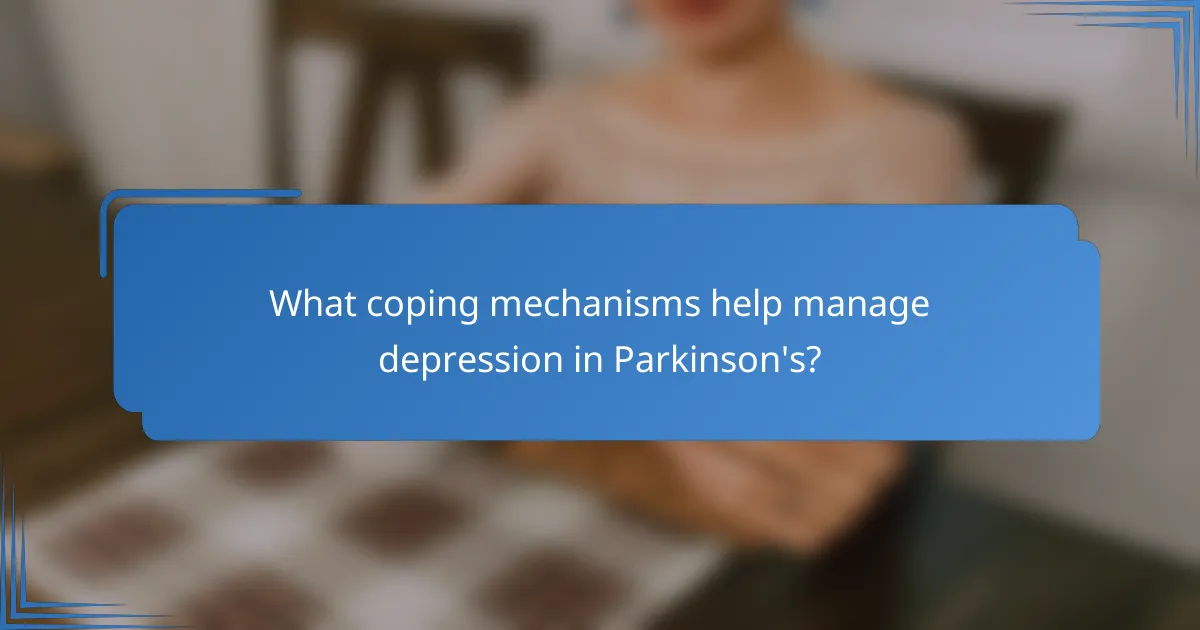
What coping mechanisms help manage depression in Parkinson’s?
Effective coping mechanisms for managing depression in Parkinson’s include physical activity, creative expression, and establishing a routine. These strategies can enhance emotional well-being and provide structure, helping individuals navigate the challenges associated with the condition.
Physical activity
Engaging in regular physical activity can significantly alleviate symptoms of depression in those with Parkinson’s. Activities such as walking, swimming, or yoga not only improve physical health but also boost mood by releasing endorphins. Aim for at least 150 minutes of moderate exercise each week, breaking it into manageable sessions.
Consider joining a local exercise group tailored for individuals with Parkinson’s. This can provide both physical benefits and social support, which is crucial for emotional health. Always consult with a healthcare provider before starting any new exercise regimen to ensure safety and appropriateness.
Creative expression
Creative expression through art, music, or writing can serve as a powerful outlet for emotions and a way to cope with depression. Activities like painting or playing an instrument allow individuals to express feelings that may be difficult to articulate verbally. This form of expression can foster a sense of accomplishment and joy.
Participating in community art classes or music therapy sessions can enhance social connections and provide additional support. Setting aside time each week for creative activities can help establish a routine that nurtures emotional well-being.
Routine establishment
Establishing a daily routine can provide structure and predictability, which is beneficial for managing depression in Parkinson’s. A consistent schedule helps individuals feel more in control and reduces anxiety about the unknown. Include regular times for meals, exercise, and leisure activities to create a balanced day.
Start by identifying key activities that are important to your well-being and incorporate them into your daily life. Using planners or digital reminders can help maintain this routine. Be flexible and adjust as needed, but aim to keep a core structure to support emotional stability.
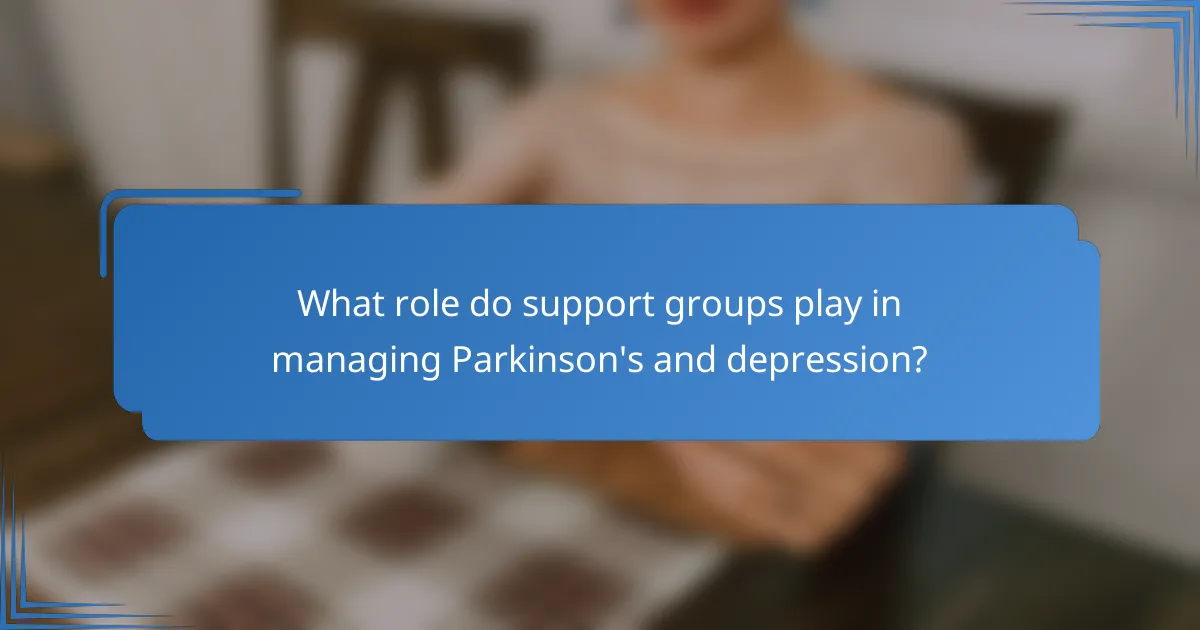
What role do support groups play in managing Parkinson’s and depression?
Support groups are vital for individuals with Parkinson’s and depression, providing emotional and practical assistance. They foster a sense of community, helping members feel less isolated while sharing coping strategies and resources.
Peer connection
Peer connection in support groups allows individuals to build relationships with others facing similar challenges. This connection can alleviate feelings of loneliness and provide a safe space for expressing emotions and concerns.
Engaging with peers who understand the nuances of living with Parkinson’s and depression can enhance emotional resilience. Members often find comfort in knowing they are not alone in their struggles.
Shared experiences
Shared experiences in support groups create an environment where members can discuss their journeys openly. Hearing others’ stories can offer new perspectives on managing symptoms and coping with depression.
These discussions often lead to discovering effective strategies and practical tips that have worked for others, making it easier to navigate daily challenges. For instance, members might share techniques for managing anxiety or fatigue related to their conditions.
Resource sharing
Resource sharing is a key benefit of support groups, as members exchange valuable information about local services, therapies, and treatment options. This can include recommendations for therapists, neurologists, or community programs that cater to individuals with Parkinson’s.
Additionally, members may share literature, websites, or apps that have helped them in their journey. This collaborative approach ensures that everyone has access to the tools and resources necessary for better management of their conditions.
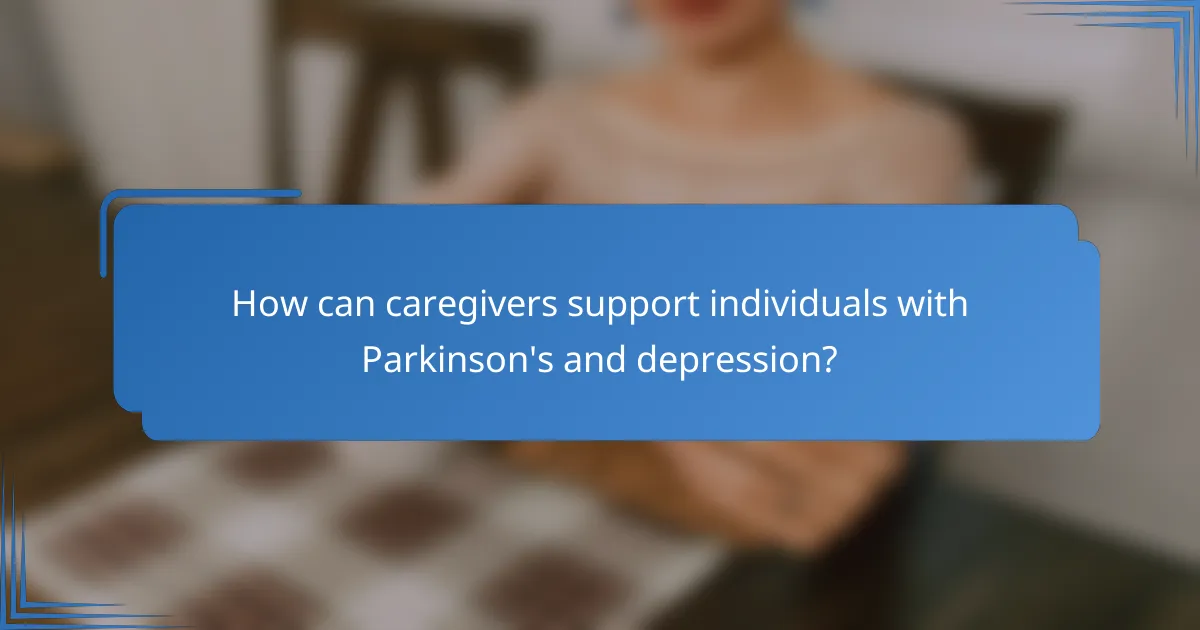
How can caregivers support individuals with Parkinson’s and depression?
Caregivers can provide essential support to individuals with Parkinson’s and depression by fostering open communication, understanding their emotional needs, and encouraging professional help. This support can significantly enhance the quality of life and emotional well-being for those affected.
Understanding emotional needs
Recognizing the emotional needs of individuals with Parkinson’s and depression is crucial for effective caregiving. These individuals may experience feelings of isolation, frustration, and sadness due to their condition, making it essential to create a supportive environment.
Caregivers should actively listen and validate the feelings of their loved ones. Simple gestures like asking how they feel or spending quality time together can help them feel understood and valued. Encouraging participation in social activities can also alleviate feelings of loneliness.
It’s beneficial to be aware of signs that indicate a need for professional help, such as persistent sadness or withdrawal from previously enjoyed activities. Caregivers should not hesitate to seek mental health support when needed, as this can lead to better coping strategies and overall emotional health.
